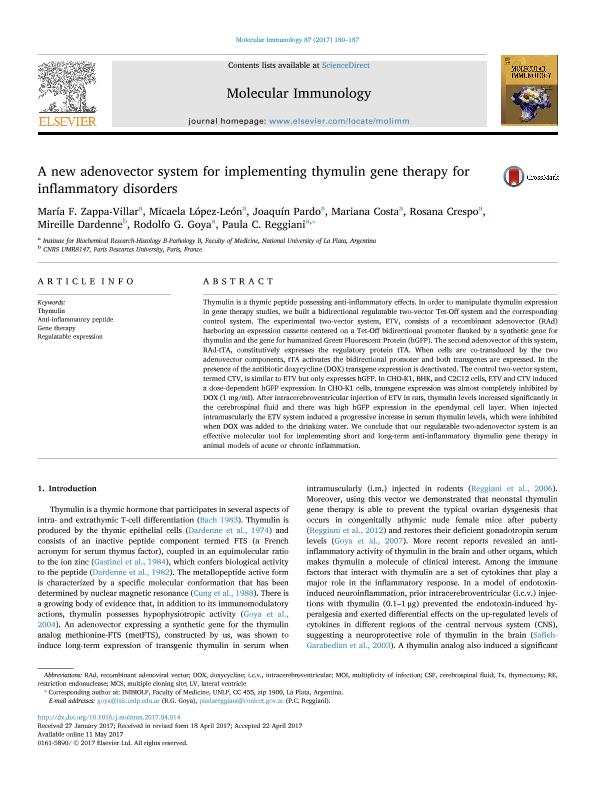Artículo
A new adenovector system for implementing thymulin gene therapy for inflammatory disorders
Zappa Villar, María Florencia ; López León, Micaela
; López León, Micaela ; Pardo, Joaquin
; Pardo, Joaquin ; Costa, Mariana Inés; Crespo, Rosana
; Costa, Mariana Inés; Crespo, Rosana ; Dardenne, Mireille; Goya, Rodolfo Gustavo
; Dardenne, Mireille; Goya, Rodolfo Gustavo ; Reggiani, Paula Cecilia
; Reggiani, Paula Cecilia
 ; López León, Micaela
; López León, Micaela ; Pardo, Joaquin
; Pardo, Joaquin ; Costa, Mariana Inés; Crespo, Rosana
; Costa, Mariana Inés; Crespo, Rosana ; Dardenne, Mireille; Goya, Rodolfo Gustavo
; Dardenne, Mireille; Goya, Rodolfo Gustavo ; Reggiani, Paula Cecilia
; Reggiani, Paula Cecilia
Fecha de publicación:
07/2017
Editorial:
Pergamon-Elsevier Science Ltd
Revista:
Molecular Immunology
ISSN:
0161-5890
Idioma:
Inglés
Tipo de recurso:
Artículo publicado
Clasificación temática:
Resumen
Thymulin is a thymic peptide possessing anti-inflammatory effects. In order to manipulate thymulin expression in gene therapy studies, we built a bidirectional regulatable two-vector Tet-Off system and the corresponding control system. The experimental two-vector system, ETV, consists of a recombinant adenovector (RAd) harboring an expression cassette centered on a Tet-Off bidirectional promoter flanked by a synthetic gene for thymulin and the gene for humanized Green Fluorescent Protein (hGFP). The second adenovector of this system, RAd-tTA, constitutively expresses the regulatory protein tTA. When cells are co-transduced by the two adenovector components, tTA activates the bidirectional promoter and both transgenes are expressed. In the presence of the antibiotic doxycycline (DOX) transgene expression is deactivated. The control two-vector system, termed CTV, is similar to ETV but only expresses hGFP. In CHO-K1, BHK, and C2C12 cells, ETV and CTV induced a dose-dependent hGFP expression. In CHO-K1 cells, transgene expression was almost completely inhibited by DOX (1 mg/ml). After intracerebroventricular injection of ETV in rats, thymulin levels increased significantly in the cerebrospinal fluid and there was high hGFP expression in the ependymal cell layer. When injected intramuscularly the ETV system induced a progressive increase in serum thymulin levels, which were inhibited when DOX was added to the drinking water. We conclude that our regulatable two-adenovector system is an effective molecular tool for implementing short and long-term anti-inflammatory thymulin gene therapy in animal models of acute or chronic inflammation.
Palabras clave:
Anti-Inflammatory Peptide
,
Gene Therapy
,
Regulatable Expression
,
Thymulin
Archivos asociados
Licencia
Identificadores
Colecciones
Articulos(INIBIOLP)
Articulos de INST.DE INVEST.BIOQUIMICAS DE LA PLATA
Articulos de INST.DE INVEST.BIOQUIMICAS DE LA PLATA
Citación
Zappa Villar, María Florencia; López León, Micaela; Pardo, Joaquin; Costa, Mariana Inés; Crespo, Rosana; et al.; A new adenovector system for implementing thymulin gene therapy for inflammatory disorders; Pergamon-Elsevier Science Ltd; Molecular Immunology; 87; 7-2017; 180-187
Compartir
Altmétricas



